| |
|
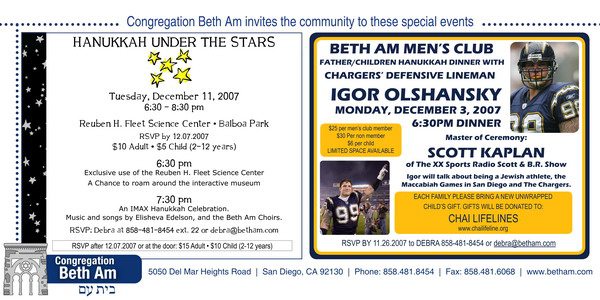
WAR AND LORE
Three reasons for saying no to the Palestinan 'right of return' demand
By Isaac Yetiv
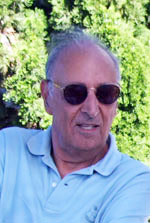 LA JOLLA, California—Twelve years ago, in a column I published in the San Diego Union-Tribune ("New Mideast 'peace' is a false promise," Sept.29,1995), I denounced the Oslo agreement mainly because they left the most intractable problems to the "final" phase. The list included: borders, water, settlements, security, Jerusalem. Conspicuously absent was the problem of the refugees, and for a good reason: Arafat, and the "moderate " Arab leaders, recognized and acquiesced to the fact that this was a non-starter, and they tacitly accepted Israel's long-standing position of no-return of the refugees to Israel proper. But after years of intense indoctrination and radicalization of the Arab masses, Arafat and his acolytes became the prisoners of their own agitation and, today, another so-called "moderate," Mahmoud Abbas, continues to claim "the right of return," a deal-breaker of the first order. LA JOLLA, California—Twelve years ago, in a column I published in the San Diego Union-Tribune ("New Mideast 'peace' is a false promise," Sept.29,1995), I denounced the Oslo agreement mainly because they left the most intractable problems to the "final" phase. The list included: borders, water, settlements, security, Jerusalem. Conspicuously absent was the problem of the refugees, and for a good reason: Arafat, and the "moderate " Arab leaders, recognized and acquiesced to the fact that this was a non-starter, and they tacitly accepted Israel's long-standing position of no-return of the refugees to Israel proper. But after years of intense indoctrination and radicalization of the Arab masses, Arafat and his acolytes became the prisoners of their own agitation and, today, another so-called "moderate," Mahmoud Abbas, continues to claim "the right of return," a deal-breaker of the first order.
Yetiv
Let us now consider the question of the refugees in all its aspects. Our analysis will be anchored in
"simple fact, plain argument, and common sense," in the wise words of Thomas Paine. We will apply the three criteria of judgment commonly considered when dealing with international issues: legality, morality, practicality.
1. Legality: The Arab leaders and their supporters cite a number of U.N. decisions to strengthen their claims for the "right of return." But they carefully avoid mentioning the mother of all U.N. resolutions and the why is there at all a refugee problem. On November 29, 1947 the U.N. General Assembly voted for partition of tiny Palestine into two independent states, a Jewish state and an Arab state. Despite the ridiculous shape and borders of the Jewish portion, the Jews accepted it; Haim Weizmann (who later became the first president of the Jewish state) declared that he would accept a Jewish state even with the size of a tablecloth. The Arabs rejected the resolution with the sword; all Arab states surrounding Israel, and the Palestinians, attacked the nascent Jewish state to "nip it in the bud...and throw the Jews into the sea." They failed. The plight of the refugees is the direct result of their aggression. To blame Israel for this human tragedy is like the Japanese blaming the U.S. for their war losses without mentioning Pearl Harbor.
2. Morality: The Arab refugee problem is not the only one in the last half century, but it is the only one that was kept festering deliberately by the Arab countries for political gains; the refugees have been used as pawns in the Arab-Israeli conflict by the Arab leaders who caused their catastrophe. They call them brothers while treating them as second class humans and depriving them of liberty, dignity, and hope. The Arab-Israeli wars have also produced a Jewish refugee problems. About 800,000 Jews fled the Arab countries through violence or fear, and most of them were absorbed in Israel where their descendants lead a decent and productive life, while the Arab refugees who, in 1948, counted no more than the Jewish refugees, continue to subsist on U.N. rations after 60 years. Outside the Middle East, millions of refugees have been settled amidst their own peoples, language, religion, culture, and social mores: When British India split into India and Pakistan, about 20 million refugees were resettled, Hindus in India, Moslems in Pakistan. Many millions of ethnic Germans were expelled from Poland and Czechoslovakia and resettled among their German brothers.The same occurred inother places in the world.The oil-wealthy Middle-East is the only exception.
3.Practicality: This is what Thomas Paine called Common Sense. Is it practical today, after six
decades, to claim the return of "four million" Palestinian refugees? Politics is the art of the possible. Here, the "even if" argument is in point Even if the "four million" were the greatest lovers of Israel, is it feasible to inundate a country with strangers that make 70 % of its population? Will the U.S. accept today 200 millions of Mexicans or Indians who claim to be victims of past wars? What about logistics, housing, jobs, education, health etc...? A fortiori when we are talking about a group of people who have been nurtured on hatred and desires of vengeance and retribution. The last riots of the second intifada have shocked the Israelis, even the peace-at-any price among them, because for the first time the "Israeli Arabs" citizens of Israel, and their leaders, members of the Israeli Parliament, called Israel "an enemy country," which many Jews see as treasonous and very scary. Who in his sane mind will acquiesce to more "fifth column" infiltration? Half of the Israeli electorate might have gone along with Clinton-Barak 's program if, as a pundit wrote, they had to sacrifice one limb or gouge one eye, but no one would have agreed to commit harakiri. This is not common sense; this is nonsense . As most Israelis understood, the claim for the "right of return" is a euphemism for the old, now smartly abandoned, call "to throw the Jews into the sea."
All issues, including Jerusalem, can be considered; the "refugee" question is a deal breaker.


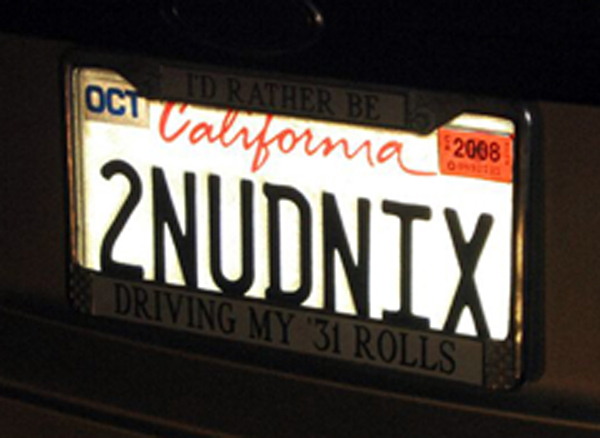
Melanie Rubin, our inveterate spotter of Jewish-themed license plates, has found this Yiddish one, evidently owned by 'wild and crazy' people with great senses of humor. It shall be added to our permanent "Mainly Melanie Jewish License Plate Collection."


Calling Israel a 'Jewish state' a misnomer
By J. Zel Lurie
DELRAY BEACH, Florida —Israel is the national home of the Jewish people. The underlying basis of Zionism, from Theodor Herzl to Ariel Sharon, is self determination for the Jewish people.
The Jewish people in Tel Aviv today includes atheists, agnostics, scientologists, Buddhists, Samaritans, Karaits, Christians who have a Jewish grandparent, religious Jews and just plain secular Jews who happen to be a majority,
To call Israel a Jewish state is misleading.
A Jewish state would be a state based on the Jewish religion.
The government of Israel is secular. It includes religious Jews and one Moslem. The majority is secular. The Israel law is secular.
The secular government and the secular majority have a respect for the minority that are religious. Communal and family affairs are still in the hands of the clergy, whether Jewish or Moslem or Christian. This system, inherited from Turkish times, troubles the secular majority and is ever so gradually being modified.
The secular majority does not respect the religious Jewish settlers on the West Bank. “God’s Warriors,” Christina Aminpour called them in a recent TV spectacular. They murder Palestinians, steal Palestinian land and destroy Palestinian olive groves. According to a recent poll, 76 per cent of Israelis do not support Jewish settlements in the West Bank.
Jewish history and tradition are not neglected in the secular schools of the Jewish majority. “Tikkun olam,” making the world a better place to live and love, lies behind the frantic efforts of the Olmert government to find a formula that his Palestinian partners can agree to which would make the forthcoming Annapolis peace summit a success.
Ehud Olmert’s recent demand that the Palestinians recognize “the Jewish State” was an aberration. Saab Erekat, the veteran Palestinian negotiator quickly scotched it by telling Israel radio that “no state in the world connects its national identity to its religious identity,”
As stated above its national identity is Jewish peoplehood. The State has no official religious identity.
But on Yom Kippur the secular majority of Jews stay home. As do the 20 percent of Israeli citizens who are Moslem and Christian. Except for the kids. They take advantage of the lack of vehicular traffic to fill the roads with their bikes and roller skates
Search for Common Ground prizes awarded
Tikkun olam was the unofficial theme of the 2007 Search for Common Ground awards which took place recently in New York City. First there was a gala dimmer at the Lighthouse, a luxury restaurant which has been constructed at the tip of Pier 61 on the Hudson River.
Common Ground awards were given to Charlie Rose of the Charlie Rose TV show, and to “Little Mosque on the Prairie,” the popular Canadian TV show, which promotes understanding through humor instead of hate.
Also to two former soldiers, Ishmael Beah, who wrote a powerful memoir of the murder and mayhem he experienced as a child soldier in Africa and to Bassam Aramin, a former Palestinian “terrorist” who has organized 300 former Palestinian militants and former Israeli soldiers into Combatants for Peace. They now advocate non-violence in their fight for peace.
Bassam Aramin could not get a visa in time to attend the dinner. His article on the tragic death of his ten-year-old daughter, shot in the head by an Israeli border guard, was featured the next afternoon at the 2007 Eliav-Sartatwi Pioneers of Peace Journalism Prizes at Columbia University School of International Affairs and the School of Journalism [from which I graduated in 1939].
The Eliav-Sartawi journalism prizes were started by me some fifteen years ago. They were taken over by Search for Common Ground but I continue to fund them each year.
The recipients this year, besides Mr Aramin, were Akiva Eldar, semior columnist of Haaretz; Salameh Nermatt, a Jordanian journalist who is the Washington correspondent of Al Hyatt in London; and Gershon Baskin, an American-born Israeli journalist who writes a column for the Jerusalem Post. Baskin is the founder and co-director of IPCRI, the Israel/Palestine Center for Research and Information, which is housed on Vatican property between Jerusalem and Bethlehem.
Writing in the Forward, Eldar pleaded with organized American Jewry to turn a new leaf in their pro-Israel activity. He contended that they should actively support Israeli and Palestinian diplomatic efforts to find a solution to their problems.
“It seems it’s much easier to lobby for empty resolutions than to call for an active American role in the peace process, Eldar wrote. “It’s more popular to sign petitions against dividing Jerusalem -- how can one divide a city that was really never united? -- than to encourage Prime Minister Olmert to turn the phrase, “City of Peace” from a cliché into a reality.”
That was in one week’s Forward. The following week the Forward’s headline was “White House Implores Organized Jewry to Support Peace Summit.”
< BACK TO TOP



St. Paul's Cathedral was the site of an interreligious service Sunday evening, Nov. 17, at which Rabbi Laurie Coskey urged Christians and Jews to oppose Minutemen
THE JEWISH CITIZEN
Rabbi at inter-faith service denounces tactics of Minutemen against migrants
By Donald H. Harrison
 SAN DIEGO--The Minutemen “are no different than the Nazis or the Klan and they live among us,” Rabbi Laurie Coskey told a joint worship service of Jews and Episcopalians on Sunday evening at St. Paul’s Cathedral. SAN DIEGO--The Minutemen “are no different than the Nazis or the Klan and they live among us,” Rabbi Laurie Coskey told a joint worship service of Jews and Episcopalians on Sunday evening at St. Paul’s Cathedral.
She added “if the experience of good and evil from the days of the Holocaust can have any redemptive value it is that we are called, every one of us, to revile hate wherever it rears its ugly head.”
Harrison
The Cathedral near Balboa Park had been the scene of a confrontation on Friday between members of the paramilitary organization and supporters of migrant workers, some of whom lack immigration documents.
The Minutemen “stood outside your sanctuary with their video cameras and hate speech rolling,” the rabbi said. “Assembly member Lori Saldana convened a group of faith and community leaders to create response to the hate speech, particularly directed toward Latino immigrants, that has become increasingly common in our print and electronic media.
“The Minutemen are emboldened KKK members so brazen they have no need to cover up their identities with cloaks or costumes,” she continued. “Their hateful rhetoric of blame and scapegoating recalls the persecution of African Americans in our country, Jews in Europe and so many other ethnic or cultural minorities who are held responsible for the ills of society by ignorant and foolish people.”
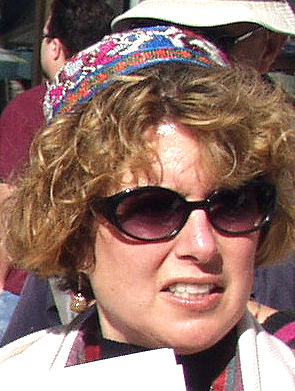 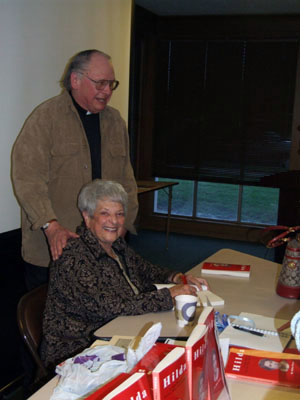
Rabbi Laurie Coskey (file photo); Author Hilda Pierce and Rev. Jack Lindquist
Rabbi Coskey is the rabbi in residence at the Episcopal cathedral and also serves as executive director of the Interfaith Committee for Worker Justice. The dean of St Paul’s, Rev. Scott Richardson, welcomed the inter-religious group of worshipers and delivered short opening remarks, while Rev. Jack Lindquist, a Lutheran Minister with reciprocal rights at the Episcopal cathedral, led a service for which a special liturgy drawing from Jewish and Christian sources had been composed.
Preceding the service, author and artist Hilda Pierce recounted her experiences as a Jewish girl in Austria from the time of the Anschluss with Nazi Germany to her two-stage immigration from Austria to England and from England to the United States. She donated proceeds from the sale of her book, Hilda: A True Story of Terror, Tears and Triumph in support of the Cathedral's interreligious work.
In her sermon, Coskey reported that she and her husband and some colleagues witnessed another incident with the Minutemen two Saturdays ago. She said that members of the paramilitary group “were rifling through one of the migrant workers encampments in the Penasquitos area…. It happens that the encampment lays a few hundred yards from million dollar home. Some of the neighbors there provide food and assistance to the migrant workers, mostly farmers.
“One of the neighbors assisting is a man named Tim,” reported the rabbi. “He tries to go into the
canyon and assist with trash pick up and removal. He is an executive at Qualcomm and is working hard to find ways in which the migrant workers can improve their living conditions.
“For those of you who haven’t seen the Minutemen in action, it’s really something. They come into your personal space with video cameras and narrate their hate films by calling you names, mocking you while filming a close up of you.
“Tim caught their attention so they followed him back to his house. A while later as he was packing his young family into the car, the Minutemen accosted them. With two toddlers strapped into the minivan and his wife settling the baby into the car seat, they started to scream at the family. ‘Wetback lovers,’ they screamed. ‘We hope that your children are raped and your house burns down.’
“The wife turned ashen. We could see that she was shaking. With restraint, they got into the car and drove away. We too were trembling from witnessing such a venomous display of hate.”
The rabbi concluded her sermon by inviting “each of you, everyone of you to participate in religious witness against hate mongering. I invite you to be hissed at and called names like ‘humanitarian’ and ‘immigrant lover.’ I invite you to stand in solidarity with those who are reviled. Today it is the immigrant, tomorrow, you know, it might be us. Let us become Righteous Gentiles, Righteous Human Beings. Yes, for the sake of those who have perished and also for the sake of our children and grandchildren.”
The congregants applauded Coskey as she turned to be led by the robed verger from the pulpit back to the chancel.
In his welcoming remarks, Rev. Richardson noted that the 69th anniversary of Kristallnacht had occurred earlier in the month. That night of broken glass, in which synagogues throughout Germany and Austria were burned and Jews were beaten, is considered by many historians to be the beginning of the Holocaust. It occurred, Richardson said, for the most part, with the complicity of the church, although there were some clergy, who at great personal risk, raised their voices against the gathering storm.
He said that as Jews and Christians worship together in an inter-religious service, they must not only look back, but also to the present and to the future. He said that in San Diego, one can again “hear the voice of fascism.” Thus far, these forces have tried to humiliate people who express concern for immigrants, or to intimidate them.
“We come together tonight to embolden ourselves,” he declared.
< BACK TO TOP


Look! Look! Dick and Jane’s new authors
practice vicious brand of partisan politics
By Dan Schaffer
 SAN DIEGO—“’See Spot run,’ said Jane.” SAN DIEGO—“’See Spot run,’ said Jane.”
The accompanying pretty, pastelly picture shows Spot the dog running to a new house where a painter is adding finishing touches to the white exterior. Jane and Dick are standing behind a nearby white picket fence watching the fun. Since they are in a first- grade Dick and Jane reader, they are 6 or 7 years old.
“See Spot run” reminds many of us--of a more than certain age--of that bland but unforgettable beginning reading series. Dick and Jane, sister Sally, Mom, Dad, Spot, and Puff the cat lived in a calm, orderly, and idealized world that flourished from the 1930s to the 1970s.
Dick and Jane were easy to make fun of, and, starting in the cynical and sarcastic 1960s, they were. There were 2 movie comedies, one in 1977 with Jane Fonda. Satiric takes abounded, from Mad Comics to The Simpsons. And, recently, there have been two books, whose laughs are based on inserting Yiddish words in the white-bread Dick-and-Jane world.
The first, Yiddish with Dick and Jane, is by Ellis Weiner and Barbara Davilman. The kids are grown and married. Jane’s husband is Bob. Their dog is, epes, a Golden Lab. (Epes means more or less. The Yiddish words are translated in a glossary at the back of the book..) Jane loves Bob: “Bob is a real mensch” (the genuine article). Get the idea, boys and girls.
Last year Weiner and Davilman wrote another story with the same Yiddish shtik. This one doesn’t tell about Dick and Jane and their families. This book is Yiddish with George and Laura (Little, Brown and Company, 2006). Yes, that George and Laura, with their family, servants, chance human encounters, and a black Scottie dog that is the spitting image of FDR’s Fala.
Illustrator Larry Ruppert did the pretty Dick- and Jane-like color drawings. The cover picture shows George and Laura in the Oval Office. Laura holds a plate of cookies and a glass of milk. George is seated at his desk. Both are smiling in our direction with a large American flag and a chanukiah behind them.
The Bushes are, of course, an old line WASP clan, but here they use lots of Yiddish words and phrases. Yiddish does not save the day for this dysfunctional mishpocheh. The family is far from idealized, and gornisht helfen (nothing can save them).
Here are a few examples of the book’s style and biases. We’ll start with the sitting president, George W. Bush, who is a shmegegge (buffoon, idiot, fool.) Another shmegegge example is Senator Joe Lieberman, who is too right-wing for the authors.
George loves his job, “not bad for an ex-shikker” (drunkard). Laura is a “nice lady and a shiksa.” (I won’t translate the really obvious words.) Daughters Jenna and Barbara are sheyne maidls (pretty girls) who, we’re told, have citations for underage drinking.
.
The family arrives at the Bush family compound in Kennebunkport, Maine; “a lot of goyim live there.” George’s mother Barb greets them. She is a farbissene (crabby, a sourpuss). George needles brother Jeb about his daughter’s drug problems. Brothers Neil and Marvin enter stage right. Both have made profits in underhanded ways. Neil compliments Barb’s cooking. George calls him a tochas lekker (speaks for itself). Even the food is unpleasant. They eat chicken croquettes, stuffed baked potatoes and succotash: “All the food is the same color.”
Up to now we’ve seen the relatively nice side of the family. Much worse is to follow.
Laura takes an after-dinner walk in the woods. She sees a baby on the ground, wrapped in a blanket. She takes the baby back to the house to show George, who loves babies, but not this time. George tells her to take the baby back to the woods, or everyone will be having babies and leaving them in the woods for other people to take care of. Laura does as she’s told, then comes back crying. She sees Poppy (Bush 41) and tells him the story. He tells her, “Saving babies is not our job.” “What is their job? “Tell the people what they want to hear. And then take all you can get.”
Barbara and Jenna come back from shopping, carrying the baby’s blanket with them. They left the baby in the woods, so that everyone won’t have babies and expect others to take care of them. George praises his girls: Zeyer sheyn gezogt! (Well said!)
This is just a small sampling of what the book says about this uncaring, cruel family. The authors tell us their specific motives in the introduction to their Yiddish-English glossary. “We wanted to examine the family dynamics and pathology of these ‘characters’… We have had numerous occasions to refer, with varying degrees of disbelief, disgust, and dismay, [to them] as ‘these people.’” The authors’ disgust and anger show up most strongly in the glossary (20 pages of 105). As you’ll find in these few examples, their verbal jabs aren’t confined to the Bushes (and Joe Lieberman):
Chalushisdick: nauseating, sickening. That would be Brit Hume of the Fox Network.
Farshlugginer: mixed up, shaken, of dubious or little value. “The farshlugginer Taliban are back [in Afghanistan]. Thank God we don’t live in a country heavily influenced by religious fundamentalists.”
Kaporah: disaster, catastrophe. “If Hillary gets the nomination, it will be a victory for her, a triumph for women, and a kaporah for the Democrats.” Hillary is too conservative for Weiner and Davilman.
And, shluf: sleep, nap. “Bush, we should be so lucky, should take one big shluf and not wake up.” That comment might have been considered rather harsh in the original Dick and Jane world, but what did those two tykes know about the real world of personality-based politics?
With Weiner and Davilman on the hunt, Spot would have good reason to run.
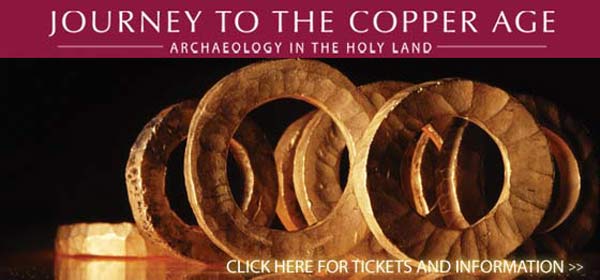

SAN DIEGO JEWISH WORLD THE WEEK IN REVIEW
MONDAY, NOVEMBER 19
Peter Garas in Canberra, Australia: Jewish knowledge and information on the web: can it be indexed for researchers?
Donald H. Harrison in San Diego: TV Phenomenon personality materializes at Soille San Diego Hebrew Day fundraiser
Joe Naiman in Lakeside, California: Is Ryan Braun baseball's first Jewish rookie of the year? It depends...
Sheila Orysiek in San Diego: 'What could not sustain them but the spirit of G-D and His grace?'
SUNDAY, NOVEMBER 18
Shoshana Bryen in Washington, D.C.: Every veteran is Hal's best Koster-mer; JINSA backs him for citizen's award
Cynthia Citron in Los Angeles: Lessons assures that audience learns too
Rabbi Baruch Lederman in San Diego: 'Pearing' our perceptions and reality
Rabbi Leonard Rosenthal in San Diego: Notice Divine presence all around us
FRIDAY-SATURDAY, NOVEMBER 16-17
Donald H. Harrison in San Diego: Beau's Geste: Student gives up bar mitzvah money so others kids can have a school
Ira Sharkansky in Jerusalem: Jewish shtetl mentality is understandable
but dangers to Jews often exaggerated
David Strom in San Diego: The saga of a Muslim woman seeking a modern life that her society would deny
THURSDAY, NOVEMBER 15
Shoshana Bryen in Washington D.C.: Parsing Secretary Rice's Mideast outlook
Joel and Arlene Moskowitz in La Jolla: Two centuries of U.S.-Muslim conflict dissected by author Michael B. Oren
Fred Reiss in Winchester, California: Fictional rabbi become a detective— as if her life wasn't already crazy enough
Dorothea Shefer-Vanson in Eilat, Israel: The joy of wintering on Israel's Riviera
Isaac Yetiv in La Jolla: Two myths will color Annapolis confab: "occupation" and "illegal settlements"
WEDNESDAY, NOVEMBER 14
Garry Fabian in Melbourne, Australia: Former Labor prime minister slams Liberals' pot shot about Israel .... Stark memories of Kristallnacht
Gaylene Fisch in Solana Beach, California: KLS: A rare syndrome affecting Ashkenazi families for which there is no known cure
Gerry Greber in Solana Beach, California: Baptist minister shares 35 years of Israeli memories with Women's Ort lunch group
Donald H. Harrison in San Diego: Strolling through the knotty questions of inter-religious and inter-Jewish relations
Sheila Orysiek in Costa Mesa, California: Tango's repetitive dance moves and lack of color in costuming can tire audiences
Dorothea Shefer-Vanson in Eilat, Israel: The quieter voices at Israel's playground
< BACK TO TOP
|
|

